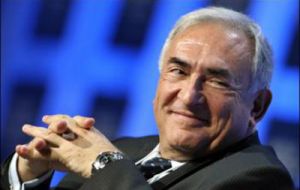MercoPress. South Atlantic News Agency
IMF chief warns about ‘capital flooding’ and ‘destabilization’
 Dominique Strauss-Khan: subtle messages to the US and China
Dominique Strauss-Khan: subtle messages to the US and China Capital flooding into Asia could lead to excessive exchange-rate moves, asset bubbles and financial instability, Domnique Strauss-Khan, the head of the International Monetary Fund, said in Shanghai Monday.
Some flows “can clearly be destabilizing,” Strauss-Kahn said in a speech distributed at a briefing after a conference sponsored by the IMF and co-hosted by the Chinese central bank.
Emerging economies have complained about near-zero interest rates in the U.S. leading to capital flooding their markets, while U.S. and European policy makers have criticized Asian governments for holding their currencies down to aid exports. Strauss-Kahn didn’t refer to the Yuan, while John Lipsky, IMF No. 2 official, welcomed China’s decision in June to allow more currency flexibility.
U.S. Federal Reserve Fed Chairman Ben S Bernanke said on Oct. 15 that additional monetary stimulus may be warranted to boost the world’s biggest economy. That fuelled speculation the Fed will embark on more easing next month, even as officials including Brazil’s central bank President Henrique Meirelles criticize low U.S. rates for triggering money inflows.
While the extra money can boost investment and growth, some flows can lead to “exchange-rate overshooting, credit booms, asset-price bubbles, and financial instability,” Strauss-Kahn said, advocating regional financial cooperation and efforts to strengthen a global safety net.
Yi Gang, a deputy governor at the People’s Bank of China, said the Yuan reform must be a gradual process, adding that increased flexibility will aid monetary policy and helps to contain inflation. He also commented at the briefing in Shanghai.
China has allowed Yuan appreciation to gather pace in the past month, spurred by U.S. and European officials’ criticism of its exchange-rate policy. U.S. Treasury Secretary Timothy F. Geithner on Oct. 15 delayed a report on international currencies, including China’s, while citing progress in the acceleration of the Yuan’s rise.
Since a two-year dollar peg was scrapped on June 19, the currency has gained 2.7%, most of which occurred in the period since September 8.




Top Comments
Disclaimer & comment rulesCommenting for this story is now closed.
If you have a Facebook account, become a fan and comment on our Facebook Page!